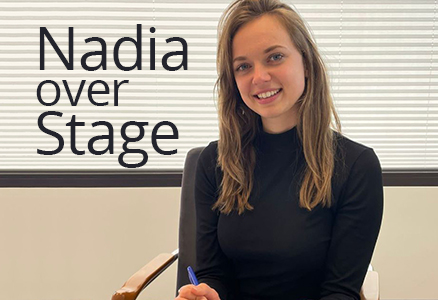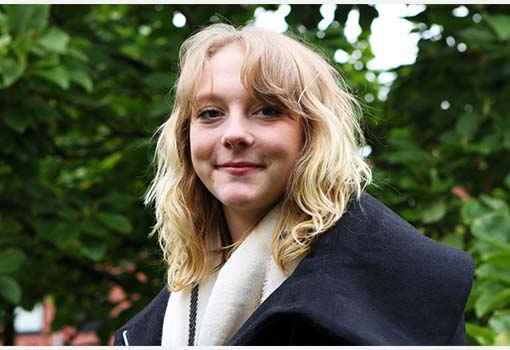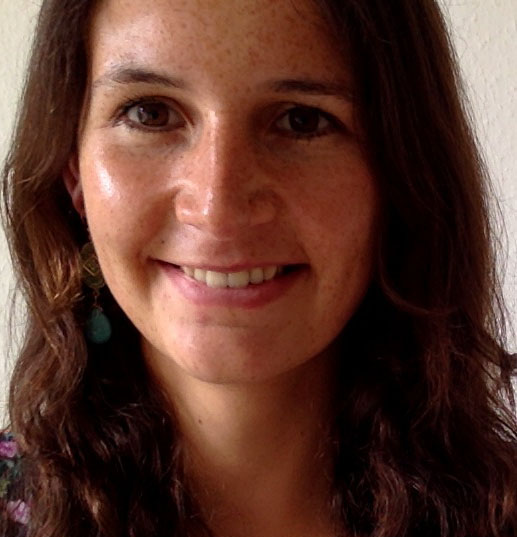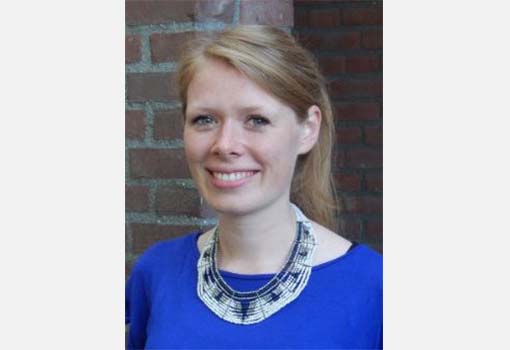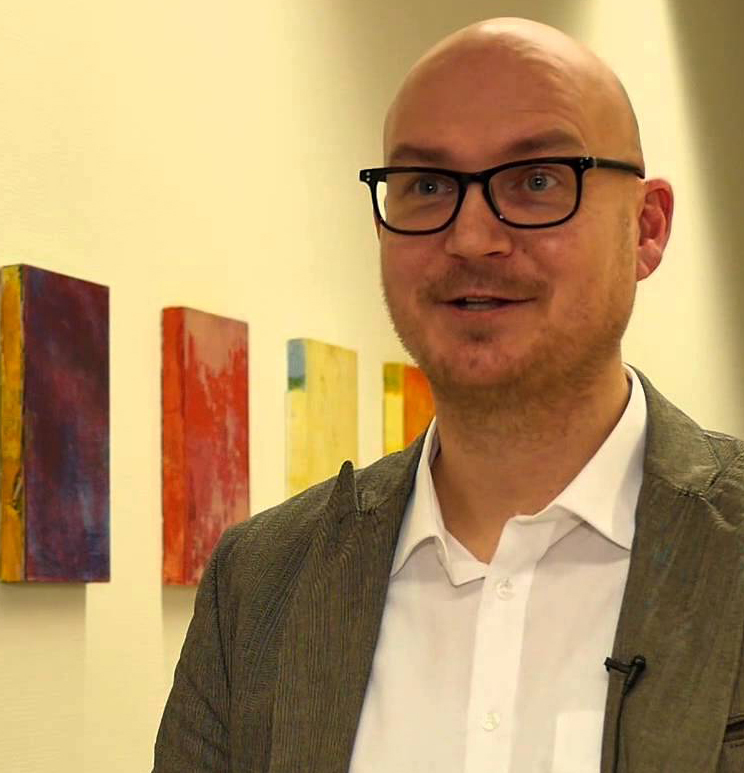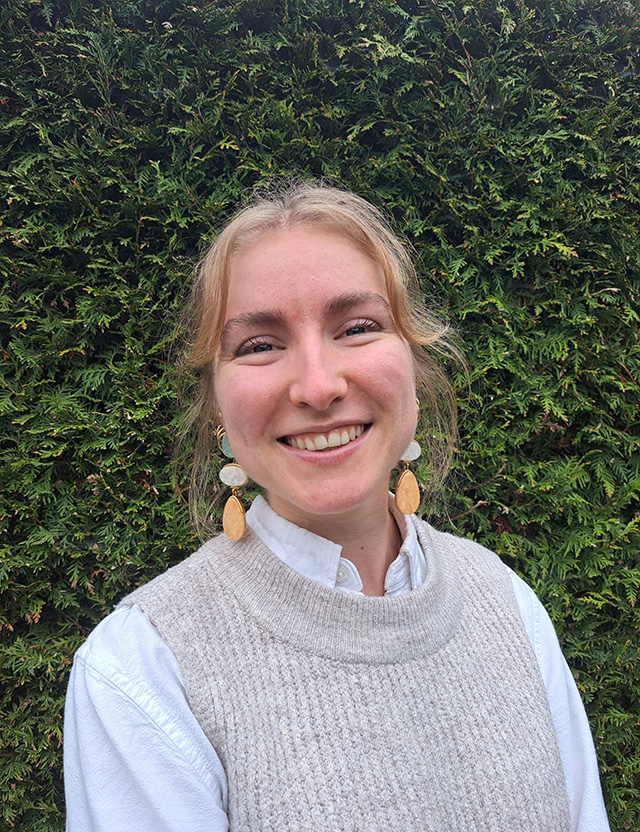
PhD Student Nienke Buist
For me, this is the best of both worlds: academic research and practical experience.
Hi! My name is Nienke Buist and I am 26 years old. At the moment, I am working on my PhD research at the University of Groningen and Lentis. My research focuses on improving the daily functioning of people with serious mental illnesses such as schizophrenia, depression or bipolar disorder.
During my studies, I was active in student associations, had various part-time jobs—including in hospitality and as a supervisor at Team050— and served as the year representative for the Master’s programme...
In terms of sports, I regularly go running and enjoy spinning classes.
Why the University of Groningen?
The University of Groningen offers a wide range of degree programmes, which makes it easy to combine different programmes. The wide choice of courses also made it easy to do a Master’s degree at this university.
I was also familiar with the UG because I grew up in a village near Groningen. The city of Groningen is a very nice place to study: it is small and cosy and many places are within walking distance. In addition, it has a lively city centre thanks to the many pubs, restaurants, unique shops, markets and music venues.
Why I chose Clinical Neuropsychology
Although the Bachelor’s programme in Biology was incredibly interesting, I learned that it was not the right fit for me. That is why in 2018, I switched to a Bachelor’s in Psychology, also at the University. I have always had an interest in neuropsychology and the brain, and this interest only grew during the Bachelor’s programme, which ultimately led to my choice of a Master’ s in Clinical Neuropsychology.
Although I never had any doubts about the Clinical Neuropsychology track, I did apply to multiple universities because the Master’s programme only has a limited number of openings, and prospective students are selected by a lottery. Unfortunately, I was initially placed on the waiting list, but luckily I was quickly accepted into the Master’s programme. Knowing what I know now, I would definitely choose this Master’s programme again. The Bachelor’s and Master’s programmes complement each other well and I was able to take some very interesting courses taught by inspiring lecturers. Experts with a lot of practical experience from various fields shared their knowledge with us during the lectures, which made the lessons extremely relevant.
Changed ambitions
During my Bachelor’s I planned to work as a psychologist, which I certainly do not rule out for the future, but my ambition to do a PhD grew during my Master’s.
I did my clinical internship in elderly care at a nice place with great supervisors. However, I noticed that there was something missing in that line of work. As part of my Master’s thesis, I worked as a research assistant on the DUPARC study at the UMCG, a prospective cohort study into Parkinson’s disease. I had a really good time working there. My role involved supervising participants during the research days at the UMCG and conducting and scoring neuropsychological tests. The combination of academic research and getting to know patients really appealed to me. This was something I could see myself doing for a long time to come!
Current job
I saw a vacancy for a PhD position via a LinkedIn post from a lecturer at the University of Groningen. I applied for the position and was able to start in October of 2023.
As part of my PhD position at both the UG and Lentis I am trying to find out whether cognitive remediation therapy and Transcranial Direct-Current Stimulation (tDCS) therapy can contribute to improvement of the cognitive and daily functioning of people with serious mental illnesses. This can then help improve a client’s recovery. I conduct a clinical trial and also administer the intervention to the participants myself. Talking to the clients is one of the things that motivates me. Their experiences make me realize the value and impact of this research, which gives me a lot of energy and motivation to do my job.
For me, this is the best of both worlds: academic research and practical experience. I think it is great to be able to combine these two aspects so closely, because you learn and see so much in practice.
Insights and advice
One of the most important things I have learned is to do what you really enjoy. If you base your choices on your own interests and passions, it will increase your motivation and make it more fun in the long run.
I also have some very straightforward advice: visit the open days and take a look around the city, at the faculty and at student associations. And apply to the register of a housing association, it could help you find a place to live later on. Also, study together with your friends, for example in the University Library. I probably spent the most of my time in coffee corners, because breaks are extremely important to stay focused on your work.
If you have completed a Bachelor’s degree at another university and you want to go to the University of Groningen for your Master’s —or the other way around— it is important to check in advance whether your study programme meets the Master’s admission requirements. It is useful to do this well in advance, so that you also have time to take any courses you may need for admission.
Finally: make use of your network! I found out about my current job thanks to my network.
In conclusion
I really enjoyed my time in Groningen and the Master’s programme in Clinical Neuropsychology. It not only gave me the knowledge and skills to grow, but also a clearer picture of what I want in the future!
Why the University of Groningen?
The University of Groningen offers a wide range of degree programmes, which makes it easy to combine different programmes. The wide choice of courses also made it easy to do a Master’s degree at this university.
I was also familiar with the UG because I grew up in a village near Groningen. The city of Groningen is a very nice place to study: it is small and cosy and many places are within walking distance. In addition, it has a lively city centre thanks to the many pubs, restaurants, unique shops, markets and music venues.
Why I chose Clinical Neuropsychology
Although the Bachelor’s programme in Biology was incredibly interesting, I learned that it was not the right fit for me. That is why in 2018, I switched to a Bachelor’s in Psychology, also at the University. I have always had an interest in neuropsychology and the brain, and this interest only grew during the Bachelor’s programme, which ultimately led to my choice of a Master’ s in Clinical Neuropsychology.
Although I never had any doubts about the Clinical Neuropsychology track, I did apply to multiple universities because the Master’s programme only has a limited number of openings, and prospective students are selected by a lottery. Unfortunately, I was initially placed on the waiting list, but luckily I was quickly accepted into the Master’s programme. Knowing what I know now, I would definitely choose this Master’s programme again. The Bachelor’s and Master’s programmes complement each other well and I was able to take some very interesting courses taught by inspiring lecturers. Experts with a lot of practical experience from various fields shared their knowledge with us during the lectures, which made the lessons extremely relevant.
Changed ambitions
During my Bachelor’s I planned to work as a psychologist, which I certainly do not rule out for the future, but my ambition to do a PhD grew during my Master’s.
I did my clinical internship in elderly care at a nice place with great supervisors. However, I noticed that there was something missing in that line of work. As part of my Master’s thesis, I worked as a research assistant on the DUPARC study at the UMCG, a prospective cohort study into Parkinson’s disease. I had a really good time working there. My role involved supervising participants during the research days at the UMCG and conducting and scoring neuropsychological tests. The combination of academic research and getting to know patients really appealed to me. This was something I could see myself doing for a long time to come!
Current job
I saw a vacancy for a PhD position via a LinkedIn post from a lecturer at the University of Groningen. I applied for the position and was able to start in October of 2023.
As part of my PhD position at both the UG and Lentis I am trying to find out whether cognitive remediation therapy and Transcranial Direct-Current Stimulation (tDCS) therapy can contribute to improvement of the cognitive and daily functioning of people with serious mental illnesses. This can then help improve a client’s recovery. I conduct a clinical trial and also administer the intervention to the participants myself. Talking to the clients is one of the things that motivates me. Their experiences make me realize the value and impact of this research, which gives me a lot of energy and motivation to do my job.
For me, this is the best of both worlds: academic research and practical experience. I think it is great to be able to combine these two aspects so closely, because you learn and see so much in practice.
Insights and advice
One of the most important things I have learned is to do what you really enjoy. If you base your choices on your own interests and passions, it will increase your motivation and make it more fun in the long run.
I also have some very straightforward advice: visit the open days and take a look around the city, at the faculty and at student associations. And apply to the register of a housing association, it could help you find a place to live later on. Also, study together with your friends, for example in the University Library. I probably spent the most of my time in coffee corners, because breaks are extremely important to stay focused on your work.
If you have completed a Bachelor’s degree at another university and you want to go to the University of Groningen for your Master’s —or the other way around— it is important to check in advance whether your study programme meets the Master’s admission requirements. It is useful to do this well in advance, so that you also have time to take any courses you may need for admission.
Finally: make use of your network! I found out about my current job thanks to my network.
In conclusion
I really enjoyed my time in Groningen and the Master’s programme in Clinical Neuropsychology. It not only gave me the knowledge and skills to grow, but also a clearer picture of what I want in the future!
lees verder ...


